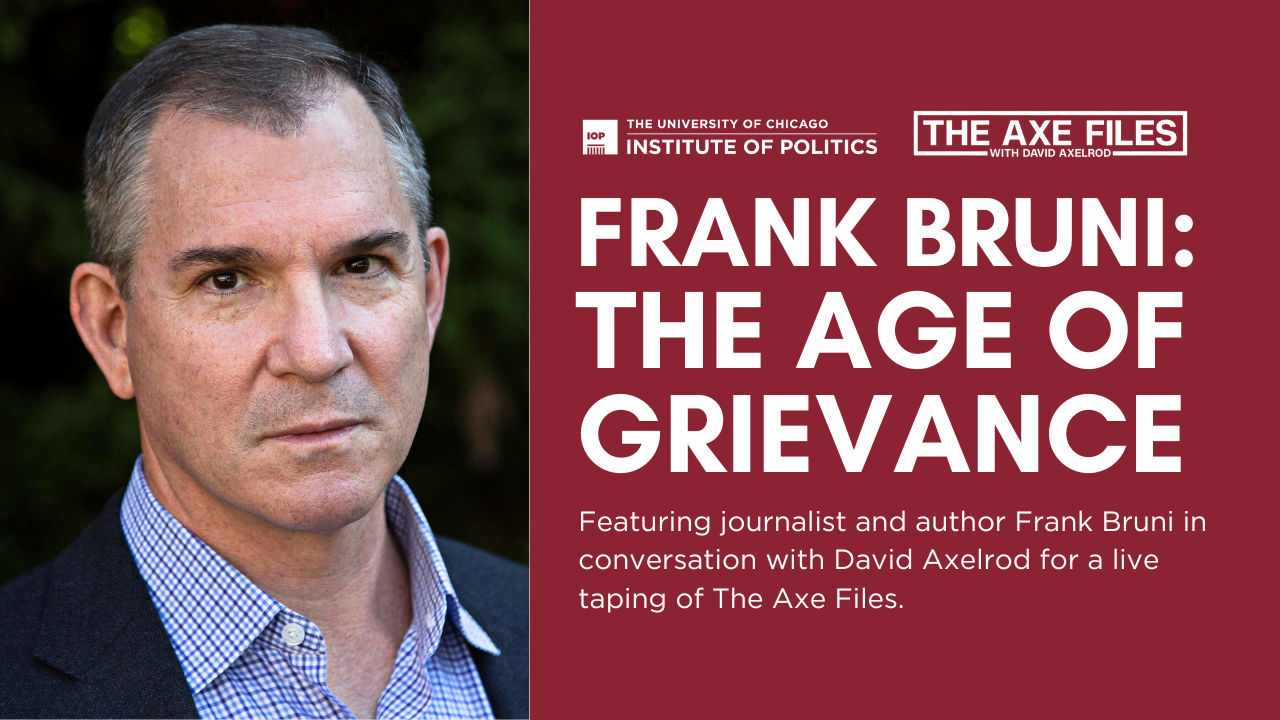The blame game is the country’s most popular sport and victimhood its most fashionable garb.The Age of Grievance
Frank Bruni
___________________________________________________________________________________
___________________________________________________________________________________
Q&A: Frank Bruni on journalism in The Age of Grievance
Frank Bruni has covered many beats in his thirty-five-year career. He was a movie critic in Detroit, a war correspondent in the Persian Gulf, a White House correspondent at the New York Times, and the paper’s bureau chief in Rome, where he covered the Vatican. On returning from Italy, he became the chief food critic and reviewed New York City restaurants (including one four-star review years ago that very much aided my career in hospitality) before turning to a weekly column in the Times’ opinion pages. “I was always, at heart, a generalist,” Bruni told me recently. And, “to be honest, a dilettante.”
Bruni’s broad background lent him credibility as he wrote his column, “Reflections on the mess (and magic) of politics and life,” for over a decade. In 2021, as he stepped back from writing columns full-time, he apologized for unloading, six years prior, on Ted Cruz, the Republican senator who had been running for president at the time. Though addressed to Cruz, the column was intended as a parting apology, of sorts, to his readers for contributing to “the toxic tenor of American discourse, the furious pitch of American politics, the volume and vitriol of it all.” The column was an argument for leaning into ambivalence and ambiguity at the expense of clicks. (Bruni is now a journalism professor at Duke; he still writes regularly for the Times.)
Bruni was certainly not an outlier in letting grievance drive his work. And his concerns from three years ago are relevant today—grievance remains a significant influence on the tenor and rhetoric of American politics, culture, and media. In a new book, The Age of Grievance, due out next week, Bruni makes the case that while grievance has led to some of the greatest social reforms in US history, its current iteration has infected American ideology in a way that “exiles nuance” and “turbocharges conflict.” While grievance is a well-established tool of the MAGA movement and its media, Bruni argues that liberal media are guilty of indulging it, too. “On both the right and the left, grievance seems to be its own burgeoning economy,” he writes. “To sell your wares as widely as possible, package them in grievance.”
Bruni tells his students at Duke that, more than anything else, they will hear him say “it’s complicated”—a phrase, he writes, that serves as a “bulwark against arrogance, absolutism, purity, zeal.” He believes the humility that phrase suggests offers an “antidote for grievance.” Last week, I spoke with Bruni about how the press can avoid perpetuating grievance culture, how it can model the importance of ambiguity, and the necessity of holding up mirrors when they are most needed. Our conversation has been edited for length and clarity.
KL: How do you define “grievance”?
FB: For the purpose of my book, I define grievance as a complaint that has become overwrought; a complaint that exists because someone is determined to complain; that demands a solution disproportionate to the problem; that exists in this context of so many people trying to establish their identities and seek advantage through how they’ve been wronged and the demands they have. If you look at where the word has popped up more frequently over the last decade, you’ll find it used in a negative context. There is grievance that can be wonderful, essential—we’re seldom calling that “grievance” anymore. The word grievance appears in the First Amendment. In that context, grievance is a righteous thing. We use it as a synonym for ire, agitation, pique.
Bruni’s broad background lent him credibility as he wrote his column, “Reflections on the mess (and magic) of politics and life,” for over a decade. In 2021, as he stepped back from writing columns full-time, he apologized for unloading, six years prior, on Ted Cruz, the Republican senator who had been running for president at the time. Though addressed to Cruz, the column was intended as a parting apology, of sorts, to his readers for contributing to “the toxic tenor of American discourse, the furious pitch of American politics, the volume and vitriol of it all.” The column was an argument for leaning into ambivalence and ambiguity at the expense of clicks. (Bruni is now a journalism professor at Duke; he still writes regularly for the Times.)
Bruni was certainly not an outlier in letting grievance drive his work. And his concerns from three years ago are relevant today—grievance remains a significant influence on the tenor and rhetoric of American politics, culture, and media. In a new book, The Age of Grievance, due out next week, Bruni makes the case that while grievance has led to some of the greatest social reforms in US history, its current iteration has infected American ideology in a way that “exiles nuance” and “turbocharges conflict.” While grievance is a well-established tool of the MAGA movement and its media, Bruni argues that liberal media are guilty of indulging it, too. “On both the right and the left, grievance seems to be its own burgeoning economy,” he writes. “To sell your wares as widely as possible, package them in grievance.”
Bruni tells his students at Duke that, more than anything else, they will hear him say “it’s complicated”—a phrase, he writes, that serves as a “bulwark against arrogance, absolutism, purity, zeal.” He believes the humility that phrase suggests offers an “antidote for grievance.” Last week, I spoke with Bruni about how the press can avoid perpetuating grievance culture, how it can model the importance of ambiguity, and the necessity of holding up mirrors when they are most needed. Our conversation has been edited for length and clarity.
KL: How do you define “grievance”?
FB: For the purpose of my book, I define grievance as a complaint that has become overwrought; a complaint that exists because someone is determined to complain; that demands a solution disproportionate to the problem; that exists in this context of so many people trying to establish their identities and seek advantage through how they’ve been wronged and the demands they have. If you look at where the word has popped up more frequently over the last decade, you’ll find it used in a negative context. There is grievance that can be wonderful, essential—we’re seldom calling that “grievance” anymore. The word grievance appears in the First Amendment. In that context, grievance is a righteous thing. We use it as a synonym for ire, agitation, pique.
___________________________________________________________________________________
___________________________________________________________________________________









No comments:
Post a Comment